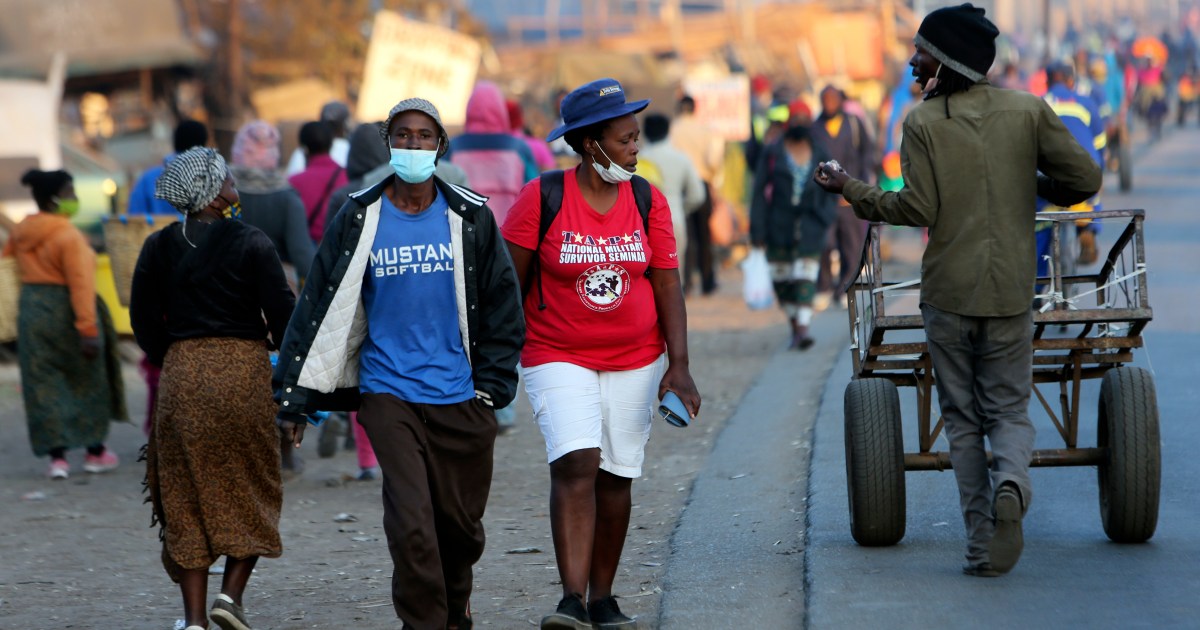Zimbabwe tightens gathering limits as COVID-19 cases rise | Zimbabwe
Harare, Zimbabwe – Zimbabwe’s government has reintroduced restrictions on gatherings and ordered strict adherence to measures aimed at slowing the spread of the coronavirus pandemic amid concerns over rising COVID-19 infections in the country.
In a news conference on Tuesday, Information Minister Monica Mutsvangwa said the number of people allowed to assemble at events of all kinds was reduced to 100.
“[The] cabinet takes this opportunity to call upon all citizens to strictly adhere to COVID-19 protective and preventive guidelines in order to arrest the surge in confirmed cases,” she said.
Authorities had eased restrictions limiting attendance in gatherings after a decline of confirmed new infections in September – but a sudden spike in recent weeks has forced a government rethink.
An analysis of official COVID-19 data shows that new cases have been rising since November and are now averaging 100 cases daily, compared to the previous two months when infections stood at about 25 a day.
As of Wednesday, the country has registered 10,129 confirmed coronavirus cases, including 277 related deaths – up from 8,374 infections and 243 deaths a month ago.
Political analyst Rashweat Mukundu said the increase “points to [a] notable failure in government’s COVID-19 response and also the mishandling of the opening up of the socioeconomic sector”.
Mukundu cited the reopening of schools last month “without adequate precautionary measures” as one of the reasons behind what he described as a “ticking time bomb”.
“The government’s response has largely been politicised,” Mukundu said, urging authorities “to go back to the drawing board”.
Economic crisis, healthcare woes
Zimbabwe is in the throes of a deepening economic crisis characterised by sky-high inflation and foreign currency shortages, as well as a devastating mix of a rapidly weakening currency and stagnant salaries and high unemployment. Medicines are in short supply and depleted state coffers mean that the government is unable to purchase sufficient supplies for state-run medical facilities.
With Zimbabwe’s fragile healthcare system on the brink, residents and health professionals have repeatedly raised the alarm over a major COVID-19 outbreak.
The government imposed a nationwide lockdown in March to contain the spread of COVID-19 in the country, but it has since eased most of its coronavirus-related restrictions amid fears of further economic malaise.
 Zimbabwe imposed a tight nationwide lockdown in March to contain the spread of COVID-19 in the country [File: Philimon Bulawayo/Reuters]
Zimbabwe imposed a tight nationwide lockdown in March to contain the spread of COVID-19 in the country [File: Philimon Bulawayo/Reuters]Almost 300 students have tested positive for COVID-19 since the resumption of classes on November 9.
Among them were more than 180 students at John Tallach High School, close to Bulawayo, the second-largest city in the country. A total 54 cases were also recorded at Chinhoyi High School, a school located in the centre of Mashonaland West province.
The affected boarding schools have been placed under quarantine, with no one allowed to enter or leave.
Meanwhile, at Matopo High School in Matabeleland South province, 10 positive cases were registered, while 20 students also tested positive for the virus at Anderson High School, a school in Gweru, one of the smaller cities in central Zimbabwe.
But authorities told Al Jazeera things were now under control.
“The situation is OK and manageable,” said Taungana Ndoro, director of communications and advocacy in the Ministry of Primary and Secondary Education. “We are confident we will be able to detect cases early,” he added, noting that most infected students under quarantine had recovered and will be allowed to leave the school premises.
Bulawayo Provincial Medical Director Welcome Mlilo described the situation in the city of some 640,000 people as “fairly stable” and “not so alarming as some parts of the country”.
But with the number of locally transmitted infections increasing in recent weeks, police have stepped up operations to enforce coronavirus measures, including hitting people in the country with penalties for not adhering to COVID-19 guidelines such as wearing face masks and observing physical distancing.


